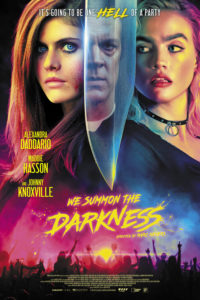Film Review: “We Summon the Darkness” Conjures a Unique, Refreshing Take on Cult Killings
Written by: Matt Patti | April 10th, 2020

We Summon the Darkness (Marc Meyers, 2019) 3 out of 4 stars.
A unique, gripping, and unordinary thriller with some shocking twists, We Summon the Darkness is a pleasant and refreshing surprise in the satanic-cult subgenre of horror films. The plot seems ordinary and pedestrian at the start, but soon enough the viewer begins to realize that this film is quite different than many films with a similar premise. It begins with three girls driving to a satanic-rock concert seemingly in the middle of nowhere: the farmlands of rural Midwest America. On their way, the friends hear a news report on the radio stating that there have been a number of killings related to the satanic cult in the area, with three more taking place just the previous night. When they arrive at the concert, they meet a group of guys who seem to be as big of fans as they are. They all enjoy the concert together, then the girls head to an after-party with the boys at a local house. There, things start out normally enough, where we learn much about our characters and their past. Then, things get strange as the night takes a dark turn.
I’ve purposefully described the plot vaguely in order to not give anything away, as there are a few huge twists that are very surprising, which I did not see coming. I came into the movie with only a vague idea of what it was about, and the less one knows before viewing the better. The writer and director do a great job of baiting the audience with a few common clichés and normalcy of the horror genre in the beginning to set up the twists. The twists are then executed perfectly, making the reveals all the more shocking.
The cast and performances in this film are all great … something I cannot say for most horror films. Alexandra Daddario (Baywatch) leads the cast as Alexis, the preppy, confident, and loudmouthed girl of the group, and while she’s wonderful in the role, her fellow castmates are equally good – especially Amy Forsyth (Hell Fest) as the shy, innocent Bev. Johnny Knoxville also provides a surprising quality performance as a pastor protesting the satanic concert – a character that is very different than most Knoxville characters. The cast collectively breathes life into each of their respective characters, making them seem very real, authentic, and unique. It is common in horror films for some characters to be indistinguishable within their friend groups, but thankfully that is not the case here, as each character is clearly defined and different.

The writing and direction in We Summon the Darkness act almost as a magician’s slight of hand trick. Each scene in the beginning of the film builds up suspense, but what we don’t see are the small little hints of what’s to come. There are subtle nuances throughout these scenes … things that the viewer takes at face value and dismisses at first, but when looked upon later take on an entirely different meaning. The director is masterful in leading the viewer exactly where he wants them to go. That being said, all of this is before the biggest twist.
Surprisingly, that twist takes place about halfway through the film … pretty early, by my count. After the twist, the film does come to a slight halt, as a game of cat and mouse ensues, somehow actually squandering the suspense a bit. The interest still remains high, and there are still plenty of surprises left, but the originality fades a bit as we follow some typical horror clichés (and this time not intended to fool the viewer). The last act of the film is unfortunately filled with some very predictable and sometimes stupid decisions, along with typical outcomes of most horror films.
All in all, We Summon the Darkness is a fresh horror flick with great performances, great writing, and an interesting, twisty plot. Although it falls to some clichés near the end, and the film isn’t very “scary” per se, it is still a unique and intriguing film that holds interest, throughout. When it comes to this film, I echo an important line from within it: “You shouldn’t believe everything you see.”

